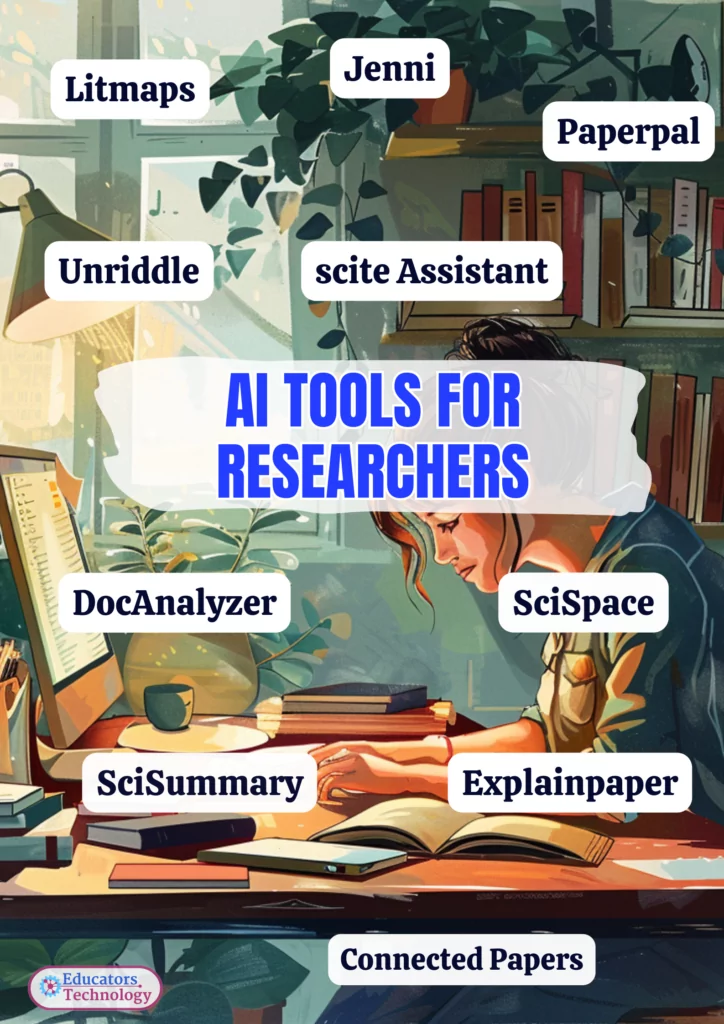
Today, I want to talk about some really cool AI tools that are changing the way we do research. This is just a small preview of what I’m putting together in an eBook full of AI tools for researchers like us. If you don’t want to miss out on the full thing, be sure to sign up for our email updates.
There’s a lot of talk about AI in universities, and not everyone agrees about using it. But, like it or not, AI is becoming a big part of research, and it’s here to stay. I believe we should use AI the right way. It’s not about just copying and pasting stuff; that’s not real research. You still have to do the hard work of reading and writing yourself. But, AI can be a huge help, kind of like having an extra assistant who’s always there when you need it. I’m all for using AI to make our research better, as long as we keep doing the important parts ourselves.
AI Tools for Researchers
Here are are some good AI Tools I recommend for student researchers and academics:
1. Litmaps
Litmaps is a tool for research students that makes finding papers and authors on a topic easy and quick. Instead of spending lots of time reading through hundreds of papers, you can use Litmaps to find the important ones in seconds. It helps you find papers you might miss otherwise and keeps you updated on new research without getting overwhelmed. You can see which papers are connected and important for your work through visual maps, making it simple to keep track of your literature review.
2. Jenni
Jenni is an AI-powered writing tool that helps you write, edit, and reference your work easily. It’s like having a helpful friend who’s always there to get you past writer’s block, suggest ways to say things differently, and make sure your citations are in order. More specifically, Jenni can:
- Suggest words and sentences as you write to help you keep going.
- Help you cite sources correctly in styles like APA, MLA, and others, using your own PDFs or research.
- Let you change the wording of any text to match the tone you need.
- Turn your research papers into written content by analyzing and summarizing them.
- Chat with your PDFs to quickly understand and summarize them.
- Import a bunch of sources at once if you have them saved.
- Export your work to LaTeX, Word, or HTML without messing up your formatting.
- Create an outline for your paper just from a prompt you provide.
- Work in multiple languages, including English (US and British), Spanish, German, French, and Chinese.
- Keep all your research organized in one place for easy citing in any document.
- Offer suggestions and help expand notes into full paragraphs, so you’re never stuck staring at a blank page.
3. Paperpal
Paperpal is a handy tool for anyone who writes academic texts like essays, theses, dissertations, or research papers. It checks your writing for grammar mistakes and makes sure you’re using the right language for academic work. With the help of generative AI, Paperpal can also create outlines, abstracts, and titles for your papers. This tool makes it easy to paraphrase your work for clarity .You can also check your work for plagiarism with detailed reports, get help generating various parts of your academic text, and even translate text from over 25 languages to English.
Related: 6 Best Text to Video AI Tools
4. Unriddle
Unriddle is a cool tool that changes how students and researchers work with documents. It gives you an AI helper for any document you’re looking at, making it super quick to find info, sum up tricky topics, and take notes easily. Unriddle is all about making your research easier and faster, so you don’t have to read every single word to find what you need.
Unriddle also helps you write and reference sources the right way. It can point out the most important sources when you highlight text, so your references are spot-on. It works in over 90 languages and has some cool extra features like a Chrome extension to summarize online articles, settings you can change to fit your needs, and the ability to work with many documents at once.

5. Connected Papers
Connected Papers helps you discover recent important works without needing to maintain extensive lists. It is a visual tool for research students and academics who are diving into a new field or ensuring their research is comprehensive. It starts with a paper you’re interested in and creates a graph showing similar papers in that field. This visual approach helps you understand the trends and main contributors quickly. It’s especially useful in fast-moving fields where new studies are constantly published.
With Connected Papers, you can also build a bibliography for your thesis more efficiently. By starting with a few key references, it finds additional relevant papers, helping you to fill in the gaps. It offers views for finding significant prior works or the latest reviews and state-of-the-art papers following your chosen study.
6. Scite Assistant
Scite Assistant is like a research companion powered by large language models (LLMs), designed to make your research process smoother and more insightful. You can ask scite Assistant any research-related question and you will get insights and explanations for its responses, helping you understand the reasoning behind its conclusions.
scite Assistant offers customizable settings to tailor the tool to your specific research needs. You can control whether you want references included, filter your searches by year, topics, or journals, and even specify the sources the Assistant should use, like your own dashboard collection or preferred journals. This level of customization ensures that the responses and sources are relevant to your specific research questions and preferences, making it an invaluable tool for academics and researchers seeking detailed and reliable information.
7. DocAnalyzer
DocAnalyzer.ai makes talking to your documents easy and smart. You can upload one or many documents and start chatting right away, getting answers to your questions in real time. This tool is great because it understands the context of your documents, making it super helpful for finding exactly what you need without any confusion. What makes docAnalyzer.ai special is how simple and smart it is to use. You can ask your PDFs questions and get back clear, detailed answers quickly. You can even share your document chats with others, making teamwork easier.
8. SciSummary
SciSummary is all about making it easier to get the gist of scientific articles fast. You can email or upload a document, and in minutes, you’ll get a summary sent right back to you. This is perfect for scientists, students, and anyone who’s busy but needs to stay on top of the latest research without reading long articles.
SciSummary uses advanced AI, like a super smart robot that can summarize any scientific article. The AI gets better over time, learning from summaries that experts check. This means you can quickly understand new discoveries and research without spending hours reading. SciSummary offers a free option for summarizing articles, and if you need more, there are affordable plans with more features.
9. Explainpaper
Explainpaper is like having a smart friend that helps you understand research papers quickly. You just upload a paper, highlight the parts you find confusing, and get an explanation. This tool is perfect for diving into complex topics and for speeding up your review process. With Explainpaper, you’re not alone when facing intimidating jargon or complex concepts.
10. SciSpace
SciSpace aims to make finding and understanding research papers a breeze. It’s an all-in-one platform where you can read papers, get straightforward explanations from AI, and explore related research. SciSpace is designed to cut down on the time researchers spend looking for information and dealing with the hassle of formatting papers. With access to metadata for over 200 million papers and more than 50 million full-text PDFs, SciSpace provides tools like a citation generator, AI detector, and paraphraser to make your research process smoother and more productive. It’s a dedicated workspace for researchers, publishers, and institutions to collaborate and discover information effortlessly.
Final thoughts
As I mentioned, these tools are just a part of the bigger picture I’m assembling in the upcoming eBook. The AI tools we explored today are stepping stones towards a more efficient, insightful, and innovative research process. But remember, they’re tools to aid us, not to replace the foundational skills of rigorous research. Embracing AI in our work, when used ethically and wisely, opens up new horizons for discovery and understanding. Stay tuned for the full eBook release, and let’s navigate this promising future of research together.




